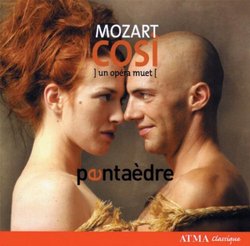| All Artists: Wolfgang Amadeus Mozart, Ulf-Guido Schafer, pentaedre Title: Mozart: Cosi - Un opéra muet Members Wishing: 0 Total Copies: 0 Label: Atma Classique Original Release Date: 1/1/2007 Re-Release Date: 4/3/2007 Genre: Classical Styles: Opera & Classical Vocal, Chamber Music, Historical Periods, Classical (c.1770-1830) Number of Discs: 1 SwapaCD Credits: 1 UPC: 722056254526 |
Search - Wolfgang Amadeus Mozart, Ulf-Guido Schafer, pentaedre :: Mozart: Cosi - Un opéra muet
 | Wolfgang Amadeus Mozart, Ulf-Guido Schafer, pentaedre Mozart: Cosi - Un opéra muet Genre: Classical |
Larger Image |
CD DetailsSimilar CDs |
CD ReviewsAn unwonted pleasure Thomas F. Dillingham | Columbia, Missouri USA | 12/09/2007 (5 out of 5 stars) "I am normally hostile to expressions of preference for opera without singing; those who say they love "the music" but can't stand the voices always irritate me. It is rather like suggesting that they love a Beethoven symphony, but would rather hear it without all those violins; or that they really like Monet's paintings, but they would be better if we just took out all the blues. Such preferences also bring back ugly memories of lps by Kostelanetz and other "opera without words" productions of my high school days. Of course, exceptions occur. Some arrangements for piano (those by Franz Liszt, in particular) are works of art in their own right. But whenever I hear an instrumental arrangement of an aria or vocal passage of an opera (these are fairly frequent with Wagner's works, for example), I am bothered by the absence of what is, after all, the most flexible and expressive of all musical instruments, the human voice.
The present example--arrangement for wind ensemble of Mozart's most gorgeous melodic creation, Cosi Fan Tutte, performed by the group called Pentaedre, is a welcome exception. Not only are the arias beautifully transcribed for wind instruments, but this group performs them with a bravura perfection that I did not anticipate. I do have an older recording by the Amadeus Ensemble, with Julius Rudel conducting, of a similar arrangement of Beethoven's Fidelio. That is also a pleasing performance, but it does not succeed in banishing my wish for the glorious singing inspired by Beethoven's music. (Yes, I know that many disagree and consider Fidelio an unsuccessful vocal work, but I disagree.) Apparently operas were frequently arranged for wind ensembles in the late 18th and early 19th century as a way of disseminating the music in less expensive form. The arrangement of Fidelio was one of those, but the arrangement for Pentaedre was by Ulf-Guido Schafer, a contemporary clarintetist. He has done a wonderful job. For anyone who loves Mozart's melodies, this is a welcome addition to (not a substitute for) one of the fine recordings of the complete opera." |


